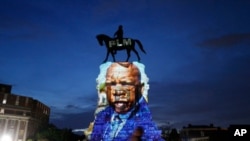The U.S. House of Representatives voted late Wednesday to clean house by removing statues honoring those who backed slavery in the United States or willingly joined the confederacy just before the Civil War.
They include statues and bust of a Supreme Court chief justice, a U.S. vice president, and General Robert E. Lee.
Wednesday’s vote in the Democrat-controlled chamber was 301-113, with 72 Republicans, including several conservatives, voting yes.
The bill now goes to the Senate, where it is unclear if Republican Majority Leader Mitch McConnell plans to bring it to a vote.
The measure would remove all statues honoring those who were seen as pro-slavery in the 19th century or upholding segregation and laws targeting Blacks.
The nationwide movement to reexamine the people being memorialized in statues and structures gained momentum after the death in Minneapolis of George Floyd – a Black man who died while in the custody of white police officers in May.
Among the likenesses to be removed would be a bust of Chief Justice of the Supreme Court Roger Taney, who wrote the 1857 Dred Scott decision declaring Blacks could not become U.S. citizens and that Congress does not have the power to outlaw slavery. It is often cited as one of the court’s worst decisions.
In 1865, the 13th Amendment outlawed slavery, and in 1868, the 14th Amendment overturned the Dred Scott decision by granting citizenship to all those born in the United States, regardless of color.
“Defenders and purveyors of sedition, slavery, segregation and white supremacy have no place in this temple of liberty," House Majority Leader Steny Hoyer said before the vote Wednesday.
Democratic Representative Barbara Lee called the likenesses “painful symbols of bigotry and racism.” She said they did “nothing more than keep white supremacy front-and-center in one of the most influential buildings in the world.”
Some in the House want to replace Taney’s statue with one of Thurgood Marshall, the first Black Supreme Court Justice.
Another statue that would be removed is that of former Vice President John C. Breckinridge, who was the youngest vice president in U.S. history The U.S. Senate expelled him after he joined the Confederate Army in 1861.
If the measure passes the Senate, President Donald Trump would still have to sign it.
Trump has decried the destruction of Civil War-era statues and other memorials, including those honoring Christopher Columbus, as an attempt to cleanse the country of its history.






